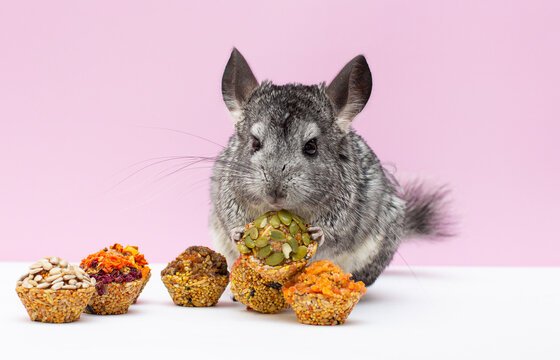
Feeding a chinchilla is not just about filling a bowl with food; it’s about balancing their nutritional needs while keeping their delicate digestive systems in mind. So, grab your coffee and settle in, because I’m here to guide you through finding the best foods for your fluffy friend, along with a handy feeding schedule that makes mealtime a breeze.
Understanding a Chinchilla’s Diet
Chinchillas are herbivores, which means their diet consists mainly of plant-based foods. They’re native to the Andes Mountains in South America, where they naturally munch on grasses, seeds, and other vegetation. This means that their digestive systems are built for high-fiber diets. Fiber helps keep their digestive tract moving and healthy, and it’s crucial for preventing problems like gastrointestinal stasis.
Here are some key components of a chinchilla’s diet:
- Hay: This should be the cornerstone of their diet, especially timothy hay, which is rich in fiber.
- Pellets: High-quality chinchilla pellets are a good source of essential vitamins and minerals.
- Fresh Vegetables: Small amounts of safe veggies can be added, but keep it minimal to avoid digestive issues.
- Treats: Moderation is key here; occasional treats like dried herbs or fruit can be given.
Understanding what chinchillas eat helps you tailor their diet to ensure they stay energetic and happy. Remember, a well-fed chinchilla is a happy chinchilla!
What to Feed Your Chinchilla
When it comes to feeding your chinchilla, think of it as creating a balanced plate. The foundation of their diet should always be high-quality hay. Look for grass hays like timothy, orchard grass, or meadow hay; these provide the necessary fiber and keep their teeth healthy as they chew.
Next up, chinchilla pellets! Choose a brand that specializes in chinchilla care, as these will typically include the right blend of nutrients. Avoid those mixed with colorful treats or seeds, as they can be too rich and lead to health issues.
So, what about fruits and veggies? Chinchillas can have a sprinkle of fresh greens like leafy romaine lettuce or small pieces of carrot. But remember, moderation is crucial! Too much can lead to stomach troubles. When giving treats, stick to small amounts of dried fruits, like a sliver of dried apple or small pieces of herbs. Always introduce new foods gradually to see how your little buddy reacts.
A Sample Feeding Schedule
Creating a structured feeding schedule helps maintain your chinchilla’s health. Here’s a simple breakdown:
- Morning: Fresh hay should be available at all times. Fill their hay rack with timothy hay.
- Midday: About a tablespoon of chinchilla pellets should be offered.
- Evening: You can introduce small amounts of fresh veggies or a treat, but keep it light—a teaspoon of dry fruit is perfect!
By sticking to this schedule, you’ll get into a reliable rhythm that your chinchilla will appreciate. Regular feeding times can help establish a sense of security for your pet.
Safe Foods for Chinchillas
While chinchillas enjoy a variety of foods, not everything is safe for them. Making sure they eat only safe foods is crucial for their long-term health. Here’s a list of safe foods to keep your chinchilla happy:
- Hay: Timothy, orchard grass, or meadow hay
- Pellets: High-quality chinchilla-specific pellets
- Vegetables: Small amounts of carrot, celery, or lettuce
- Treats: Dried herbs, hay-based treats, or occasional dried fruits
Avoid giving your chinchilla any sugary foods, like cereal or empty-calorie snacks. Foods high in sugar can upset their digestive systems and lead to serious health problems.
Foods to Avoid
It’s just as important to know what not to feed your chinchilla as it is to know what’s safe. Some foods can be harmful or even toxic. Here’s a quick list of foods to steer clear of:
- Fruits: Citrus fruits like oranges and lemons, as well as most fresh fruits
- Grains: Bread, seeds, and nuts can be a no-go
- Vegetables: Onions, garlic, and anything starchy should be avoided
- Processed Foods: Anything with added sugars or preservatives
If you encounter something you’re not sure about, it’s always best to double-check before offering it to your chinchilla.
Monitoring Dietary Changes
As with any pet, monitoring your chinchilla’s eating habits is crucial. If you notice changes—like a decrease in food intake, diarrhea, or excessive drooling—this could indicate a health problem.
Chinchillas can be sensitive creatures, and stress or new foods can cause disruptions in their digestive health. Always introduce any new food slowly, and consider keeping a food diary to track what they eat and how they respond. This can help you identify any potential issues before they escalate.
Feeding your chinchilla a balanced and appropriate diet is key to their happiness and health. By focusing on high-fiber hay, quality chinchilla pellets, and the occasional treat, you can ensure your furry friend thrives. Setting a consistent feeding schedule builds trust and routine, creating a happier home for both of you.
Remember, every chinchilla is unique, so it may take some time to find out what works best for your little buddy. By paying attention to their preferences and health, you’re already on the right path. So, enjoy those moments spent together, and watch your chinchilla flourish with the right love and food!
